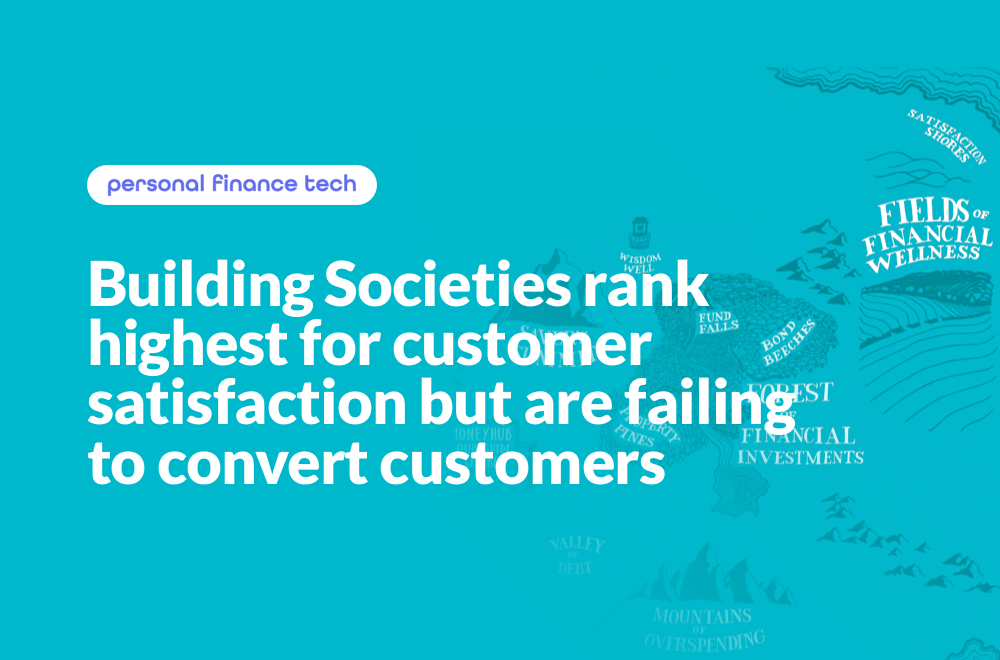Customers ranked supermarkets and Building Societies as the most likely to put their customers’ interests first
Energy providers, social media and insurers ranked the lowest in Moneyhub’s research
The FCA calls for Building Societies to embrace Open Finance or risk struggling to attract the next generation of customers
Building Societies are failing to convert high customer satisfaction rates into expanding their customer base, and risk losing market share within the younger demographic to challenger and neobanks with superior digital offerings, according to a new report from Moneyhub. Younger generations show a marked preference for Open Banking and Open Finance enabled interactions and to secure a future, Building Societies must align their offerings with these digital expectations.
The report, “Digitise or die”: a call to arms for building societies’, delves into how Building Societies can navigate the critical juncture they find themselves in: being at the forefront of the digitisation of financial services while retaining their reputation for being customer-centric and community-focussed.
Building Societies’ reputation for customer centricity is reflected in the data. When respondents were polled on which customer-facing businesses were most likely to act with their customers’ interests at heart, it found that energy providers, social media firms and insurers were ranked lowest, scoring 20%, 22% and 22% respectively. Building Societies and Supermarkets were at the top of the list at 41% each.
However, despite the public perception that they are the most likely to look out for their customers’ best interests, Building Societies possess just a third (32%) of market share and are struggling to attract the younger generation of savers. The market share drops to just 24% amongst 18-34 year olds. Although the figure is less stark, this problem is not limited to Building Societies. High street banks see their market share dip from 52% of the UK overall, to 49% for 18-34 year olds. Instead, younger generations are increasingly more likely to turn to the challenger and neobanks for their financial products - this group holds over a quarter of market share amongst 18-34 year olds compared to 16% overall. Specialist sustainability banks also have increased in popularity amongst the younger generations having 8% market share amongst this group compared to 6% of the UK overall.
In addition the data found that 68% of 18-34 year olds favoured using a digital app to manage their money and that it could help them save more, compared to 48% of the overall population, and 66% want access to financial products and services without the need to visit a physical branch- demonstrating the need for Building Societies to digitally evolve to meet the needs of future generations.
When investigating what drives customers to choose financial products, the research found that the provision of a good online platform and an easy application process were both considered important by 80% of respondents, while an easy to use digital app came in at 67%. Brand recognition is still one of the key influences, with 68% saying it was important to them.
When asked why they weren’t prepared to switch to a Building Society, 19% of respondents said they didn’t know enough about Building Societies to choose one and 12% say they haven’t seen them advertised.
Mark Horwood-James, MD of Personal Finance Technology at Moneyhub comments: “It’s clear that Building Societies have a strong group of core customers, and have developed a well deserved reputation for acting with the customer’s interests at heart. As well regarded financial institutions, they are currently selling short their best attributes and failing to appeal to younger demographics by failing to evolve their digital offerings.
“Part of the solution to this problem is embracing the digital capabilities at their disposal and showing that their product offerings can match the neo and challenger banks with their services. The FCA recently said that the Building Society sector must embrace technology and continue to evolve without losing their community-centred credentials*
“In addition, speaking at the Building Societies Annual Conference, chief executive of the Building Societies Association (BSA), Robin Fieth, unveiled his ambition to double the membership of UK Building Societies over the next decade. At Moneyhub, we believe that this ambition is possible if there is an effort to adopt Open Finance across Building Societies.”
-Ends-
Notes to editors
*Source: Building our societies through lending and savings, Speech by Emily Shepperd, FCA Chief Operating Officer delivered at the Building Societies Annual Conference, 09/05/2024, “By leveraging innovations such as Open Finance, AI, and digitalisation, building societies can streamline operations, boost resilience, and enhance the customer experience.” https://www.fca.org.uk/news/speeches/building-our-societies-through-lending-and-savings
Contacts
Ingrid Anusic Eleanor Ross
Marketing Director, Moneyhub Senior Account Director, Teamspirit (Moneyhub PR Agency)
ingrid.anusic@moneyhub.com ERoss@teamspirit.uk.com
M: +44 783 722 6553 M: +44 7393 758 446
Research Methodology
Research conducted by Opinium Research on behalf of Moneyhub amongst 2,000 UK consumers (nationally representative sample). To provide further insight for the whitepaper, Lansons Team Farner interviewed 16 senior Building society stakeholders in February and March 2024. Interviewees were drawn from a mix of large and medium-sized Building Societies, as well as the Building Societies Association and Open Banking Limited.
About Moneyhub
Moneyhub’s goal is simple; to work with our clients to improve the financial wellness of people, their businesses, and their communities. Hundreds of companies use our award-winning Open Banking and Open Finance technology to better understand their customers through data so they can comply with Consumer Duty, deliver them more suitable products, and automate money management or payments to ultimately increase their capacity to spend, save or invest more.
For more information, please visit www.moneyhub.com.

